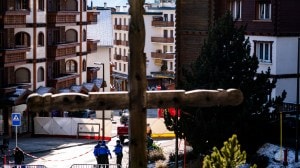This debate can146;t be doctored
There will be heightened vigilance in Britain and I, as an immigrant of Indian origin, welcome it

When two years ago the 7/7 events happened on London8217;s underground, the shock was not that there was a terrorist attack but that the perpetrators were British Muslims. The idea that Muslims born and brought up in the UK could so turn against the country where they had gone to school, worked, got married, had children and worked was frightening. At that time I pointed out that in Northern Ireland, British Catholics and Protestants had been doing the same for quite a while, so where was the surprise.
That said, the people carried on as if nothing had happened to change their daily life. The dead and the injured were looked after and mourned for. There was no backlash on Muslims and, to this day, the majority of Muslims and South Asians who after all may be mistaken as being Muslims have led peaceful and safe lives.
In the wake of that event British politicians stepped up their efforts both to understand Muslims better and also be more vigilant about extremists among the Muslim youth. The focus is on Muslim youth now just as it was on IRA and Ulster Volunteer Force then. There is also a realisation that the integration of Muslims into British life is a challenge that must be faced. In the last forty years I have lived here, Britain has made greater efforts to foster a multi-cultural and multi-racial society than any other country I know of.
Problems remain. Not just with Muslims but also with Afro-Caribbean immigrants and even Indian Hindu or Sikh origin British 8216;Asians8217;. There are problems of housing or educational under-achievement and racism but the policy is to foster tolerance. It is easy to be sceptical as people in India felt during the Shilpa Shetty episode. But ask yourself this question, is a Nigerian ever likely to receive Indian citizenship and how many schools in Delhi would tolerate it if 130 different languages were spoken by primary school children as is the case in London?
But the most recent failed attempts to set off car bombs in London8217;s West End and the appalling and amazing sight of a car being driven into Glasgow airport and set on fire with a driver burning and fighting with the police were completely unexpected. Mobile phones were recovered from the London cars and two arrests were made on the spot in Glasgow. The puzzle this time around is that the suspects are medical doctors and that they are not British citizens, but recent immigrants who have all worked in the NHS.
The idea that doctors who are supposed to heal could be plotting to burn innocent bystanders by setting off car bombs is frightening. The fact that they are all foreign doctors recently relocated to the UK rings alarm bells. Thus far, the doctors arrested are suspects and not yet been convicted. But it looks like Al-Qaeda has plotted to use sophisticated professionals 8212; doctors 8212; from abroad to mount a horrendous series of terrorist attacks. It is a piece of luck and the fruit of vigilant ambulance drivers and bomb disposal experts that no one died.
Britain is the most open country for immigration in Europe. Until the recent enlargement of the EU, it welcomed migrants from all countries. Now unskilled and semi-skilled migrants can only come from within the EU but skilled professionals can come subject to a points system. The NHS has 40 per cent of doctors who are immigrants, not including the ethnic British who have qualified as NHS doctors. These immigrant doctors are vetted for knowledge of medicine and for language proficiency, though let me say that my local GP and his locum replacement are both French-speaking Africans who are challenged in the English-speaking department.
Thus far there have been no security checks on immigrant doctors. The issue now is, should Britain introduce such checks and should MI5 be given the task? Even before the events of the last week, Gordon Brown, the new prime minister, had inducted a retired Sea Lord, Sir Alan West, into his government as a minister for security and anti-terrorism. He will be made a lord soon and take his seat and be a minister in the home office. He will now be given the task of examining whether new checks are needed, for immigrants who come as doctors or for that matter professionals in other categories.
This relates to foreign immigrants, not to local citizens who may be Muslims or Sikhs or Rastafarians. There is no backlash and no panic in the UK. Life goes on normally and there are the usual 8216;experts8217; on TV networks telling us about Islam and Al-Qaeda and Iraq and so on. But a society has to protect its citizens against terrorist attacks. Even before Iraq, the UK was conscious after 9/11 that it could be attacked. The rhetoric from many extremists, including those who died in 7/7, promises an incessant war against 8216;infidel8217; British. Muslims including a Hindu converted to Islam, Dhiren Barot convicted recently have been quoted as calling women going to nightclubs as 8216;slags8217; who deserve to die. This is why one of the London bombs was placed near a night club which was having a ladies8217; night. These terrorists are sick, and no amount of effort is too much to protect citizens against such people.
But I am confident that Britain will remain open and friendly. There will be no backlash, no pogrom. Britain won8217;t have its Godhra-type riots where hundreds get killed and the police idly stand by. There will be heightened vigilance and I, as an immigrant of Indian origin, welcome it.
The writer is a member of the House of Lords, UK, an economist and author of 8216;Rethinking Islamism: Ideology of the New Terror8217;
- 01
- 02
- 03
- 04
- 05































